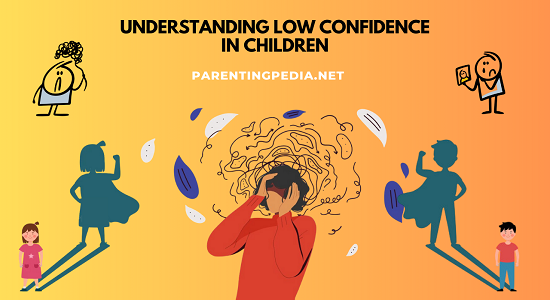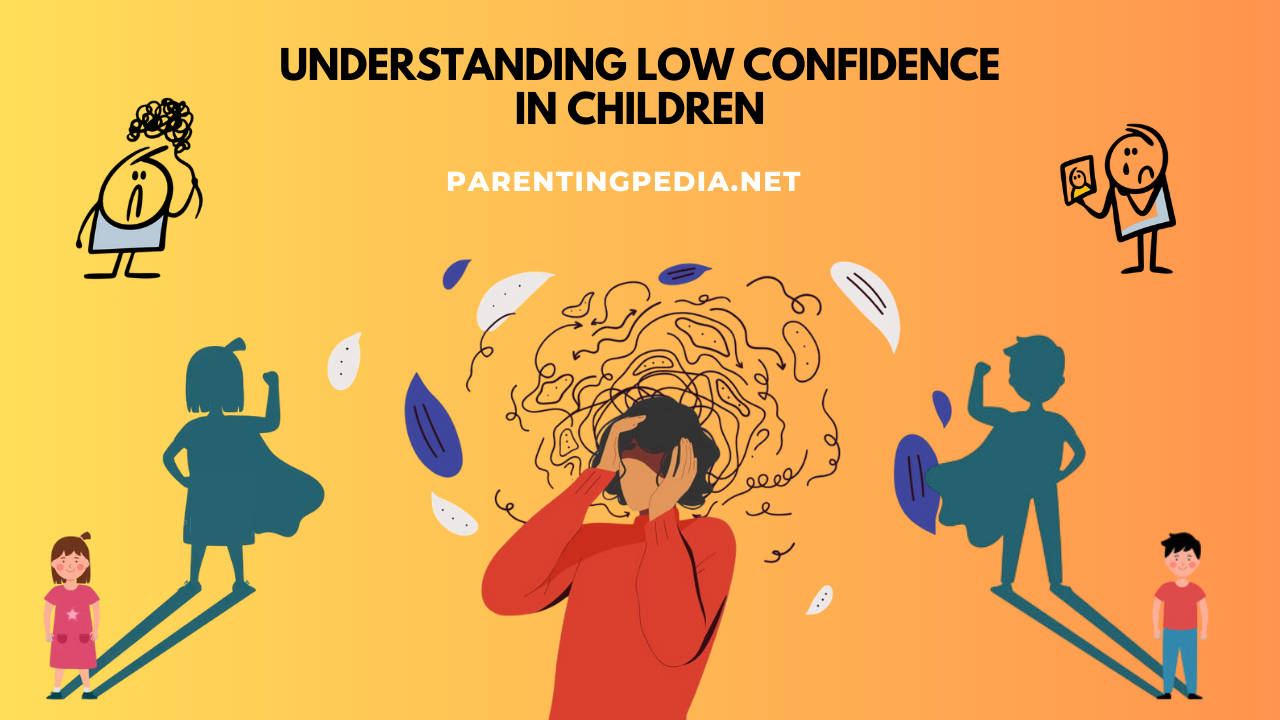Low confidence in children is a common yet significant issue that can affect their emotional well-being, academic performance, and social interactions. Confidence shapes how children understand themselves and their abilities, influencing their willingness to face challenges and embrace new experiences. Factors such as parenting style, peer pressure, academic expectations, and personal insecurities play a crucial role in shaping a child’s self-esteem. Without help, low confidence can lead to anxiety, isolation, and long-term self-doubt. By understanding the root causes and promoting a supportive environment, parents, educators, and caregivers can help children build resilience and develop a healthy sense of self-worth.
Causes Of Low Confidence In Children
Low confidence in children can arise from various internal and external factors. Below are some of the reasons for low confidence in children:
1. Parenting Style and Family Environment
Family plays an important role in child’s life for self-worth and confidence. Parenting styles can significantly influence how children perceive themselves:
- Overly Critical Parenting: Constant criticism or high expectations can make children feel they are never good enough. Repeated focus on their shortcomings rather than their strengths can reduce self-esteem in children.
- Overprotectiveness: Parents who protect their children from failure or make all decisions for them unintentionally send the message that they are incapable of handling challenges independently.
- Neglect or Lack of Support: Emotional neglect or an absence of positive reinforcement can lead children to feel undervalued or unworthy of attention and love.
2. Academic Pressure and School Environment
School plays an important role in a child’s development, and experiences in school can shape confidence of children:
- High Academic Expectations: Children who struggle to meet high academic standards may feel inadequate, especially if they recognize themselves as less capable than their peers.
- Bullying and Peer Rejection: Negative interactions with peers, including bullying, teasing, or exclusion, can significantly damage a child’s self-esteem and lead to feelings of unworthiness.
- Comparisons in School: Class rankings, grades, and constant comparisons to other students can create a sense of inferiority, particularly for those who do not excel academically.
3. Personal Characteristics and Temperament
Each child has a unique personality that influences how they respond to life’s challenges:
- Introversion or Shyness: Introverted children may find it difficult to express themselves or connect with others, which can lead to feelings of isolation, self-doubt and low confidence in children.
- Perfectionism: Children with perfectionist tendencies often set unrealistically high standards for themselves. When they fail to meet these expectations, it can lead to low confidence.
- Low Resilience: Some children are naturally less resilient, struggling to come back from setbacks or criticism, which can undermine their confidence over time.
4. Media Influence and Societal Pressures
In today’s interconnected world, children are exposed to social media and thus, unrealistic societal expectations that can affect their self-image:
- Unrealistic Standards: Social media and advertisements often present idealized versions of beauty, success, and happiness, which can lead children to feel inadequate in comparison.
- Cyberbullying: Negative comments or online bullying can increase insecurities and cause lower self-esteem and low confidence in children.
5. Physical Appearance and Health
Children who feel self-conscious about their appearance or health may struggle with confidence:
- Body Image Issues: Concerns about weight, height, or other physical attributes can lead to feelings of inferiority in children.
- Chronic Illness or Disabilities: Health challenges can make children feel different from their peers, affecting their confidence in social and academic settings.
6. Limited Opportunities and Experiences
Children who are not given opportunities to explore and develop their abilities may feel unprepared to face challenges:
- Lack of Skill Development: Without opportunities to try new activities or develop interests, children may feel uncertain about their capabilities.
- Fear of Failure: Overemphasis on success without acknowledging the value of effort can make children hesitant to try new things for fear of making mistakes.
7. Trauma or Emotional Distress
Negative experiences can have a lasting impact on a child’s confidence:
- Family Conflict or Divorce: Turmoil or conflict at home can leave children feeling insecure, emotionally vulnerable and can cause low confidence in children.
- Traumatic Events: Abuse, loss of a loved one, or other traumatic experiences can significantly affect a child’s self-esteem and sense of safety.

Consequences Of Low Confidence In Children
Low confidence can have far-reaching effects on a child’s life, influencing their emotional, social, and academic well-being:
- Emotional Impact: Children with low confidence may experience anxiety, depression, and feelings of inadequacy. They may avoid challenges and become overly self-critical.
- Social Challenges: Low confidence can make it difficult for children to form and maintain healthy relationships. They may struggle with communication, avoid social situations, or become overly dependent on others.
Also Read: Understanding Mental Trauma In Children And Teens
- Academic Performance: A lack of self confidence can hinder a child’s ability to focus, take risks, and persist in the face of difficulties, resulting in lower academic achievement.
- Long-Term Effects: If unaddressed, low confidence can persist into adulthood, affecting career prospects, relationships, and overall life satisfaction.
Strategies to Build Confidence in Children
Fortunately, there are many ways to support children in developing healthy self-esteem. Here are practical strategies to help build child’s confidence:
1. Promote a Positive and Supportive Environment
- Celebrate Efforts and Achievements: Recognize and praise children’s efforts, not just their successes. This reinforces the idea that effort and persistence are valuable.
- Avoid Criticism: Provide constructive feedback without harsh criticism. Focus on areas of improvement while acknowledging their strengths.
- Show Unconditional Love: Ensure children feel loved and valued regardless of their achievements or behavior.
2. Encourage Independence
- Let Them Make Decisions: Allow children to make age-appropriate choices to develop a sense of free will.
- Promote Problem-Solving Skills: Encourage them to find solutions to challenges, which builds their confidence in handling difficulties.
3. Provide Opportunities For Growth
- Expose Them to New Experiences: Encourage children to try new activities, join clubs, or explore hobbies. This helps them discover their strengths and interests.
- Teach Resilience: Help children understand that failure is a natural part of learning. Share stories of famous figures who overcame challenges to achieve success.
4. Address Negative Influences
- Monitor Media Consumption: Limit exposure to unrealistic portrayals in the media and discuss the difference between reality and curated content.
- Combat Bullying: Address bullying promptly and provide support to help children rebuild their confidence.
5. Model Confidence
- Demonstrate Self-Belief: Children learn by observing adults. Show confidence in your abilities and face challenges with a positive attitude.
- Encourage Positive Self-Talk: Teach children to replace negative thoughts with encouraging ones, such as “I can try again” or “I am improving.”
6. Seek Professional Support When Needed
- Therapy or Counseling: If low confidence persists or is linked to trauma or mental health issues, consider consulting a child psychologist or counselor.
- School Support Programs: Engage with teachers and school counselors to create a supportive academic environment.
Conclusion
Low confidence in children is developed by issues influenced by family dynamics, school experiences, personal traits, and societal pressures. While its effects can be huge, they are not irreversible. By understanding the underlying causes and implementing strategies, parents, educators, and caregivers can help children develop a strong sense of self-worth and resilience. Nurturing confidence in children equips them with the tools they need to navigate challenges, form meaningful relationships, and achieve their full potential, ensuring a brighter and more fulfilling future.
FAQ
Why do children lack confidence?
Children may lack confidence due to overly critical environments, fear of failure, or comparisons with others. Negative experiences like bullying, academic pressure, or lack of encouragement can reduce self-esteem. Additionally, overprotective parenting, limited opportunities to explore strengths, and societal expectations contribute to self-doubt and hinder the development of confidence.
How to support children with low self-esteem?
Support children with low self-esteem by offering consistent encouragement and celebrating their achievements. Promote open communication, listen without judgment, and validate their feelings. Encourage them to pursue their interests and set achievable goals. Teach resilience by framing mistakes as learning opportunities, and model positive self-talk to build their confidence.
Remember, the greatest reward of parenting lies in watching
your children soar with love and confidence.
Till then keep smiling and be happy

